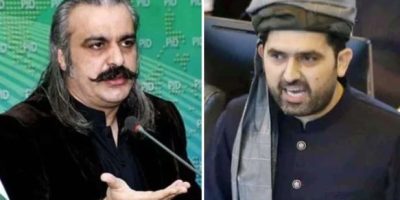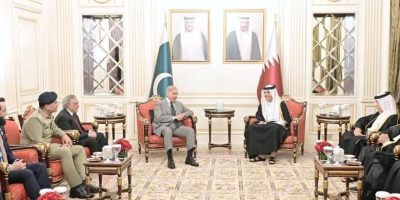IICR) organized a round table on Baluchistan security

IICR) organized a round table on Baluchistan security
DNA
On Thursday July 21, 2022, Islamabad Institute of Conflict Resolution (IICR) organized a round table session titled “Securing Balochistan Amid Hybrid Warfare Through development”. The esteemed panelists included Senator Anwaar UlHaqKakkar, Dr. Nazir Hussain, Dean Social Sciences University of Wah, Lt. Gen. Naeem Khalid Lodhi®, and Lt. Gen. Dr. Zahid Latif Mirza®. Dr. Mansoor Ahmed, PRO Vice Chancellor University of Turbat Balochistan, and Dr. Farah Naz, Assistant Professor Department of Governance and Public Policy NUST. The session was moderated by Ms. Sabah Aslam Executive Director, IICR..
While speaking to the forum Senator Anwaar UlHaq Kakar talked about myth surrounding that federation has exploitative policies towards Balochistan. Senator Kakar further added that Balochistan insurgency is deep rooted in the province and has at times rose again and again with extreme violent attacks. There has been negligence on our end and it has fanned the insurgency, said the senator. Adding further he said that there has been constant advocacy of Baloch insurgency from politicians or leaders which has worsened the situation. The conflict is there, insurgency is there, and it is not because of grievances rather organized conflict against state of Pakistan said the senator Kakar. He further said that the insurgents see politicians as in hypocrites and openly denounce any sense of grievances as a cause of insurgency. Further senator Anwar said that in this situation the response of the state got confused. He emphasized that any notion that Baloch insurgency is due to grievances of insurgents with state is false. In his concluding remarks senator Kakkar said that state is not willing to fight BLA.
The second speaker on the panel was Dr Farah Naz, while talking about hybrid warfare and Balochistan,She said that Balochistan is a test case of hybrid warfare against Pakistan. Every aspect of hybrid warfare is there in Balochistan. She further said that Balochistan has been ruled by its own people,people of Balochistan always look to federal government rather than introspection towards there own rulers. Balochi people need to introspect where the fault lines. Dr. Naz also said that the conflict in Balochistan is directly linked with development in the province specifically CPEC. India and Iran has direct involvement in the instability in Balochistanand Gawadar remains the main target.
Speaking next to the fora Dr. Nazir talked about the current situation in Balochistan. He said thatthe debate on Balochistan is necessary we have fault lines in Balochistan and we need to accept it. It is unfortunate that We have a tunnel view of the real issues in closed comfortable rooms said Dr. Nazir. Adding further Dr. Hussain said thatit is a false assumption that these issues can be solved through barrel. We don’t have any genuine expertise on Balochistan. Dr. Nazir also said that foreign countries have developed and has dedicated expertise on Balochistan specifically India andUS, which they exploit to the fullest. Lastly he said thattill now we don’t have yet diagnosed the issue in Balochistan. We try to control and resolve Balochistan through Islamabad which will lead us no where.
The next speaker on the panel was Dr. Mansoor Ahmed who spoke about peace and development in Balochistan. He highlighted that it has been tested before to bring peace through development which is failing miserably, development doesn’t bring peace it’s the other way round. We need to realize it. Dr. Ahmed added further that Balochistan shall be given due importance in right way and its rights shall be addressed as well. People in Balochistan lack basic human facilities which is a give issue in increasing insurgency. While recommending Dr. Mansoor said that state needs to own the Balochistan through political and institutional will to solve issues.
While addressing the audienceNaeem Lodhisaid that dialogue is necessary in order to resolve the issue in Balochistan. It is an absolute wrong notion that military suppresses the people. Military is the stake holder in peace development in the province. Adding further Gen. Lodhi said that it has been debated that Balochistan lack basic rights but it unfortunate that no identifies what rightsare not being provided. They have appropriate share in the center. They are ruled by their own people and after 18 amendment it is the ruler who should be asked. Balochistan is a complex of societal, economic and political flaws and adding to it is the foreign intervention which worsens the situation, said Gen Naeem. He further added that it’s the suppression of the rulers rather than federation which has deprived the province. Talking about CPEC Gen. Lodhi said that Balochistan is vital to CPEC specifically Gwadar. In his concluding remarks he said that international factor cannot be neglected in Balochistan insurgency. Specifically when Balochistan is neighboring Iran and Afghanistan.
The last speaker on the panel was Lt. Gen. Dr. Zahid Latif Mirza. While speaking Dr. Mirza said thatBalochistan is a protracted conflict. Successive governments have lacked the comprehensive solution to resolve the issue. Giving historical reference Dr. Zahid said that since the independence of Pakistan there has been inconsistencies in Balochistan and state has a history of having cosmetic response to it. It is in-apt handling of the federation of the issue which is raising more complexities in conflict resolution. Adding further he said that there is a sense of alienation in people of Balochistan and what have we done in order to curtail it. All the initiatives which were launched in different governmentsfaced down run because of lack of political will and proper institutionalized approached. While recommending Dr. Zahid said that unless and until structural reforms are brought in the provincial governments there would be no solution. Tendency of labelling Baloch as anti state shall be stopped before engaging in further solutions.
The session concluded with the remarks from Senator Anwaar UlHaqKakkar.
Related News

Gandapur says security withdrawn, KP govt denies claim
ISLAMABAD, FEB 24: Former Khyber Pakhtunkhwa (KP) chief minister Ali Amin Gandapur on Tuesday saidRead More

PM Shehbaz meets Qatari counterpart to boost ties
DOHA, FEB 24 /DNA/ – Prime Minister of Pakistan, Muhammad Shehbaz Sharif, during his officialRead More


Comments are Closed